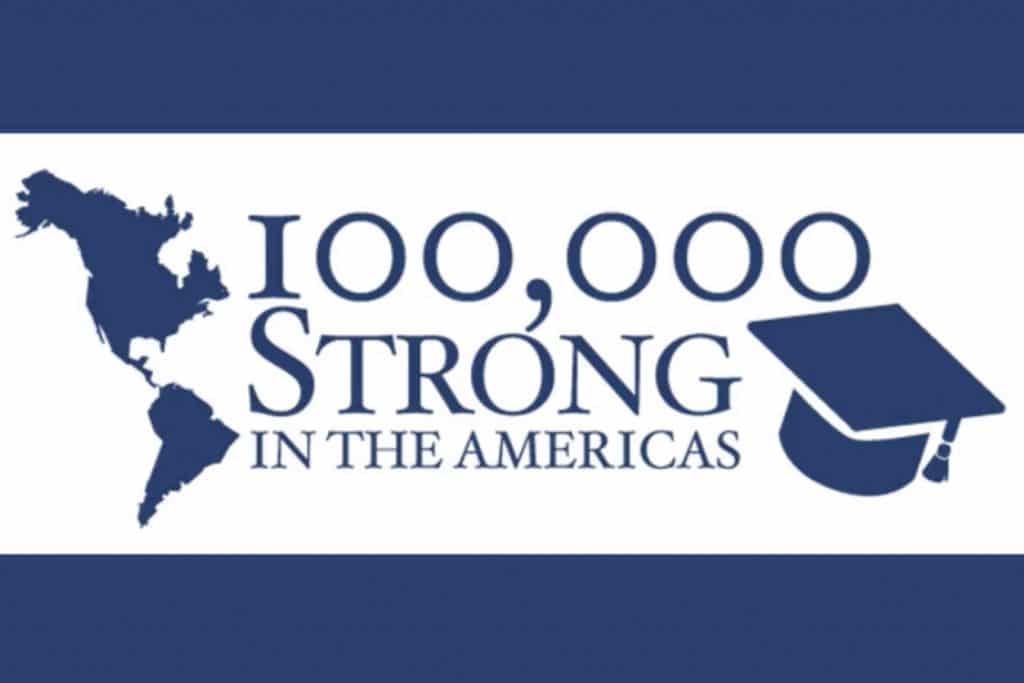A grant from 100,000 Strong in the Americas will give a dozen Northern Arizona University the opportunity for a unique cross-cultural learning experience with peers at both NAU and a university in Sonora, Mexico.
NAU is partnering with Universidad de Sonora (UNISON) in Hermosillo, Sonora, Mexico to put on The Big IDEA (La Gran IDEA), which will allow 12 students from each university to collaborate on finding solutions to challenges of food security and financial security in the Arizona/Sonora Megaregion. It is based on Jacks Big IDEA, which is put on by boundaryless@nau.
The grant winners were announced Wednesday; NAU was one of 11 universities in the United States to win funding. The 100,000 Strong in the Americas (100K) Innovation Fund is a public-private sector collaboration between the U.S. Department of State, U.S. embassies and Partners of the Americas, working with companies, foundations and academic networks to stimulate and support higher education partnerships between the United States and the rest of the Western Hemisphere.
These higher education partnerships ensure that students have access to academic training programs that help them gain experience working in teams, solving real-world problems, doing research and gaining technical and linguistic skills imperative for today’s workforce.
Kristin Allen, a program manager in Strategic Global Initiatives at the Center for International Education and principal investigator on the grant, said in this binational project, the six four-student teams will each have to create a product or service that addresses a specific issue affecting the region. This will happen in four phases; the first, which will take place in August and September, will be entirely virtual. The teams, which will be comprised of two students from each university, will receive their problem statements, meet virtually with faculty advisers from NAU and UNISON to get context on these issues, all of which will be related to financial inclusion and agriculture/food sustainability, and will attend an online interdisciplinary design workshop.
In the second phase, later in the fall, the students will meet in Hermosillo, get to know their teammates, make site visits to local communities and continue to discuss their ideas for their product or service. For phase three, the students will be in Flagstaff; they will have 48 hours to refine their design and then will pitch it to a panel of judges, which will include industry and community leaders and faculty members.
For the final phase, the winning team will travel to Mexico to present their product or service to leaders at Fundación Banorte or Fundación Gruma, which are sponsoring this round of grants. All travel is dependent on the COVID-19 pandemic and will be reconsidered as necessary.
“The benefits really are astronomical at every level,” Allen said. “The students will gain the ability to work in cross-cultural teams, learn how to communicate with one another in different languages and gain the know-how and expertise to confront the challenges faced by a global workforce. For NAU, working with the two universities allows us to expand our educational presence and bring new ideas and perspectives to our campus and expand our internationalization efforts. On the international scale, these grants are a way to facilitate diplomacy efforts between countries through higher education.”
Curtis Smith, the boundaryless@nau director, is the co-PI. Professor Alder Keleman Saxena of the Department of Anthropology and director Joseph Guzman of the Economic Policy Institute are key faculty contributors to the program and will provide support to the student teams. Tina Zecher, evaluation associate at NAU’s Center for Science Teaching and Learning, will lead the evaluation and assessment for The Big IDEA.
This program is open to undergraduate students from all majors and years in school. Applications will open during the spring semester.
This is NAU’s fifth Innovation Fund grant and the second in two years. Last year’s project was Leaders United for Positive Energy, which was an interdisciplinary learning course that started conversations about sustainability and ethics in the energy sector, led by Interdisciplinary Programs Director Melissa Armstrong and Allen. NAU collaborated with Technological University of Hermosillo and three universities from Argentina on the program.



